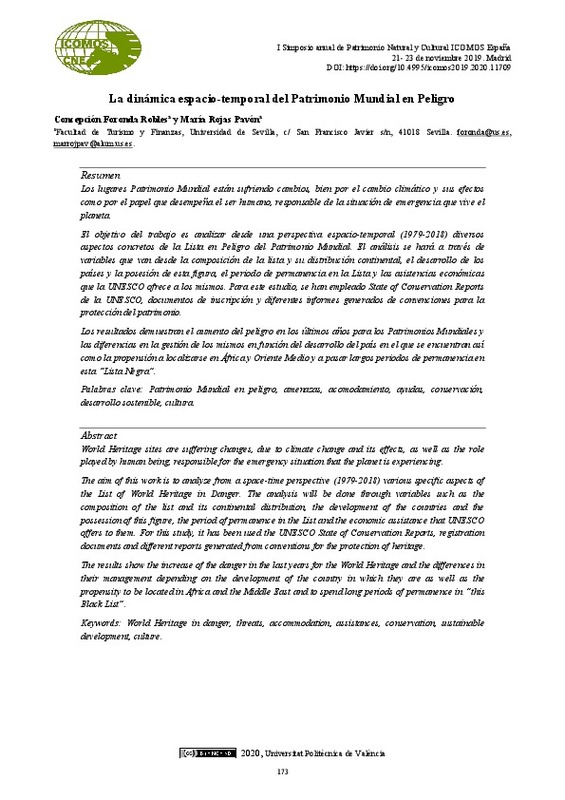JavaScript is disabled for your browser. Some features of this site may not work without it.
Buscar en RiuNet
Listar
Mi cuenta
Estadísticas
Ayuda RiuNet
Admin. UPV
La dinámica espacio-temporal del Patrimonio Mundial en Peligro
Mostrar el registro completo del ítem
Foronda Robles, C.; Rojas Pavón, M. (2021). La dinámica espacio-temporal del Patrimonio Mundial en Peligro. En I Simposio anual de Patrimonio Natural y Cultural ICOMOS España. Editorial Universitat Politècnica de València. 173-180. https://doi.org/10.4995/icomos2019.2020.11709
Por favor, use este identificador para citar o enlazar este ítem: http://hdl.handle.net/10251/160481
Ficheros en el ítem
Metadatos del ítem
| Título: | La dinámica espacio-temporal del Patrimonio Mundial en Peligro | |
| Autor: | Foronda Robles, Concepción Rojas Pavón, María | |
| Fecha difusión: |
|
|
| Resumen: |
[EN] World Heritage sites are suffering changes, due to climate change and its effects, as well as the role
played by human being, responsible for the emergency situation that the planet is experiencing.
The aim of this ...[+]
[ES] Los lugares Patrimonio de la Humanidad están sufriendo cambios, bien por el cambio climático y sus efectos como por el papel que desempeña el ser humano, responsable de la situación de emergencia que vive el planeta. ...[+]
|
|
| Palabras clave: |
|
|
| Derechos de uso: | Reserva de todos los derechos | |
| ISBN: |
|
|
| Fuente: |
|
|
| DOI: |
|
|
| Editorial: |
|
|
| Versión del editor: | http://ocs.editorial.upv.es/index.php/icomos_es/icomos2019/paper/view/11709 | |
| Título del congreso: |
|
|
| Lugar del congreso: |
|
|
| Fecha congreso: |
|
|
| Tipo: |
|








